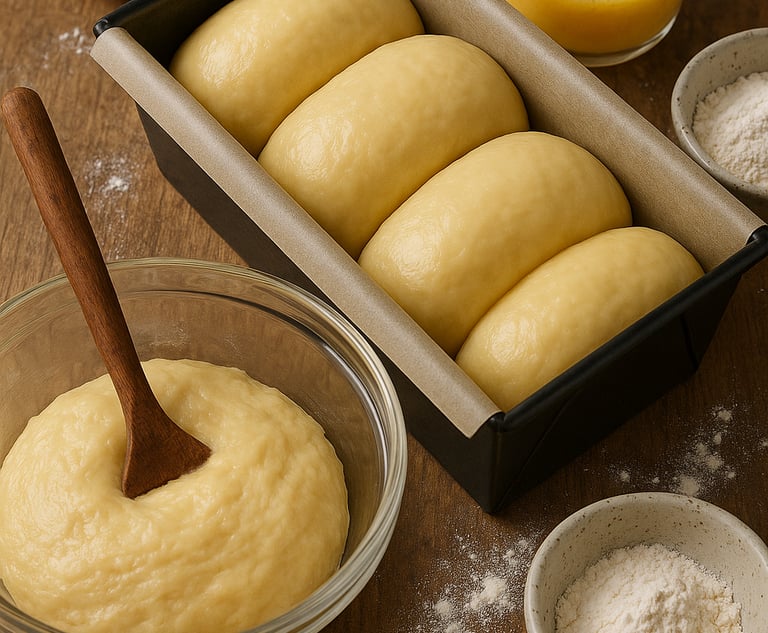The Brioche of the Meek
Jean, a former aid worker turned baker, learns from brioche how Jesus' blessing on the meek rises gently — a rich, humble bread ready to inherit the earth.
BEATITUDES
Wandering Armenian
7/26/20253 min read


The Brioche of the Meek
The butter felt cold against Jean Baptista's calloused palms as he worked it into the soft brioche dough, his weathered hands moving with a tenderness that still surprised him. Six months ago, these same hands had gripped steering wheels through dust storms in Sudan, had built makeshift shelters, had held dying children. Now they folded dough with the reverence of prayer.
His heart clenched as he remembered why he was here, in this quiet kitchen instead of the field. The burnout had crept in like morning fog—first the sleepless nights replaying faces he couldn't save, then the anger that made him snap at colleagues, finally the crushing weight that made even breathing feel like failure. His supervisor had been gentle but firm: "Go home, Jean. Rest. Heal."
That morning, as steam rose from his coffee and golden light filtered through the kitchen window, he'd opened his Bible to Matthew 5:5: "Blessed are the meek, for they will inherit the earth."
The word "meek" stuck in his throat like a bitter pill. In the aid world, meek people got trampled. You had to be loud, assertive, relentless to get supplies through checkpoints, to negotiate with warlords, to make donors listen. Meek meant invisible. Meek meant ineffective.
But as he kneaded the brioche dough—this impossibly rich bread that required such gentle handling—something shifted inside him. His shoulders, perpetually tensed for the next crisis, began to soften. The dough yielded under his touch, not from weakness but from trust, surrendering to become something beautiful.
Tears he'd been holding back for months finally came, dropping silently onto the marble counter. He thought of Amara, the Sudanese woman who had lost three children to famine yet still sang lullabies to other mothers' babies. Of Hassan, the Syrian boy who shared his last piece of bread even as his own stomach cramped with hunger. Of Maria, his elderly neighbour here at home, who never complained despite losing her husband, her savings, her health—yet somehow always had a smile for the mail carrier.
These weren't the strong ones the world celebrated. They were the meek—the bendable ones, the ones who absorbed life's blows without breaking, who found strength not in fighting but in yielding, not in taking but in giving.
Jean's chest tightened with recognition. Maybe, his breakdown wasn't a failure. Maybe, it was surrender. Maybe, God was teaching him a different kind of strength—one that rose slowly, like brioche dough, expanding not through force but through patient transformation.
He covered the dough with a damp cloth and watched it begin its slow rise. No hurry, no pressure, just quiet growth. Like healing. Like hope. Like the kingdom of God itself.
Hours later, when he pulled the golden loaf from the oven, its crown gleaming like precious metal, Jean felt something he hadn't experienced in years: peace. The brioche looked humble, unassuming, but its fragrance filled the entire kitchen with richness that made his mouth water and his heart full.
He sliced the warm bread carefully, wrapping it half in parchment paper. As he walked to Maria's door, the weight of the loaf in his hands felt sacred. She opened the door with surprise and delight, her eyes bright with unshed tears as she breathed in the aroma. "Oh, Jean," she whispered, pressing the warm package to her chest. "How did you know I was feeling so alone today?"
Standing on her doorstep, watching this woman who had lost everything light up with joy over a simple loaf of bread, Jean finally understood. The meek weren't the weak—they were the ones who knew how to receive grace, how to be filled by small mercies, how to find God in ordinary moments. They would inherit the earth not by conquering it, but by learning to truly live on it.
Walking back to his kitchen, Jean felt his calling shift. Maybe, he wouldn't return to the field. Maybe, his work now was different—feeding souls one loaf at a time, learning that sometimes the greatest strength comes from admitting you need to be held, kneaded, and gently shaped by hands more skilled than your own.
The Beatitudes weren't just teachings, he realized. They were invitations—to a life that rose slowly, filled the room with blessing, and fed the hungry world one generous slice at a time.
That night, as the last light faded and his kitchen still carried the sweet scent of fresh bread, Jean whispered a prayer of surrender that felt like coming home.

